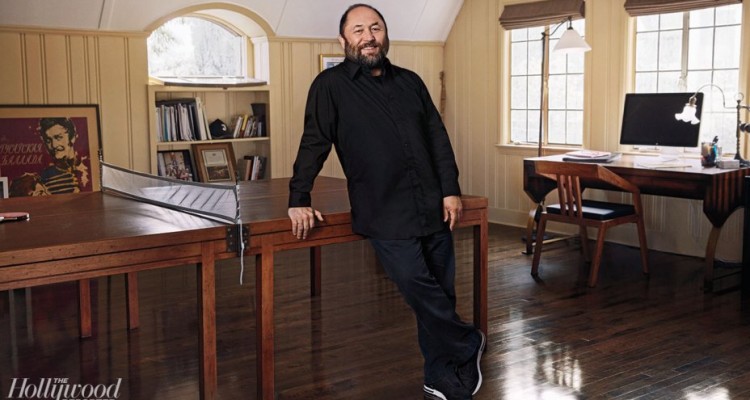Russian filmmaker and visual effects guru Timur Bekmambetov opens up about why he lives in Walt Disney’s old home, how the studio system is “like the Titanic” and virtual reality movies.
Walking into the home office of Timur Bekmambetov, the filmmaker behind Wanted, Abraham Lincoln: Vampire Hunter and the upcoming Ben-Hur (Aug. 19), one wouldn’t expect to find a shrine to Walt Disney. After all, the Kazakhstan-born filmmaker first made his mark with the creepy, visually inventive R-rated horror fantasy Night Watch, which became Russia’s highest-grossing film in 2004. He followed that with the sequel Day Watch (which topped its predecessor) before his first American film — 2008’s Angelina Jolie vehicle Wanted — earned $341.4 million worldwide. But today, the director-producer lives in Disney’s former Los Feliz property and has filled it with sketches of animated characters and a custom pingpong table featuring Mickey Mouse figurines. “He was a visionary man. He invented a whole world,” says Bekmambetov, 55, of Disney. Bekmambetov is attempting to create a whole world with his most expensive film to date, Ben-Hur, Paramount and MGM’s nearly $100 million-budget adaptation of Lew Wallace’s 1880 novel. And he hopes to escape the shadow of the 1959 adaptation with Charlton Heston that grossed nearly 10 times its $15 million budget ($124 million in today’s dollars). Along with directing, Bekmambetov, who is married to costume designer Varvara Avdyushko and has two daughters, not only produces movies in the U.S. (such as 2015’s social media-centered Unfriended, which cost just $1 million and grossed $64 million worldwide, and STX’s recent first-person shooter Hardcore Henry) but also makes films in Russia, where he runs the visual effects production company and studio Bazelevs. That company recently opened its first U.S. office (plus one in China), making Bekmambetov’s business truly global.
Where do you spend most of your time?
I’m everywhere because of the internet. When it’s midnight in Los Angeles, it’s 10 o’clock in the morning in Moscow. So I’m finishing my working day here, and then people wake up in Moscow, and I’m Skyping calls because I’m producing and directing in Russia. And now we’ve opened the office in Beijing.
What’s the purpose of a China office?
It happened by accident. We made a movie in Russia called He Is Dragon. It was not successful in Russia. Suddenly, maybe three months after the Russian release, I got a call that said the movie is all over the internet [in China], pirated. It’s the story about how a young girl falls in love with a dragon-man. And girls in China fell in love with this dragon-man. We sent the producer to China, and he met all the distributors, and they decided to release it theatrically, and now they make sequels. So this was the reason to open a small office in China.
Was it intimidating to take on an iconic story in remaking Ben-Hur?
It was scary. It’s a great, great book. It’s very unique because it’s a fictional version of the biblical story. It’s very rare when you have material with a message. And at the same time, it’s very entertaining because of the unbelievable naval battles and chariot races. But I like to take a risk and do something nobody wants to try. The 1959 movie is not the same as the book, which has a very different message. The book was written about forgiveness, and the movie they made in 1959 — a great movie — it’s about revenge and miracles. Our movie is different.
How did you find your lead, Jack Huston?
Jack Huston came to read Messala’s lines. After I met him, I called the studio and said, “I think we found Judah.” And it was very symptomatic that he likes Messala’s character because in this movie, Messala and Judah are both likable. It’s not good boy versus bad boy. They’re not fighting with each other; they’re both fighting with fate, with fate testing them, testing their love, their brotherhood. When we found Jack, it was really easy to pick Toby Kebbell because he was the perfect opposite.
You were extremely in-demand after Wanted but decided to keep working in Russia rather than do a sequel or Hollywood films. Why?
Because I’m always looking to do something different. If I don’t know how to do things, it’s a signal to me that I must try. And I’m trying to find projects that are unconventional, as a director and as a producer. It’s how we produced the movie Unfriended two years ago and Hardcore Henry this year. I’m doing it because I’m enjoying the creative process, and if it’s challenging and I have a possibility to discover something for myself, then that’s a reason to do it. I’m still doing Russian movies because it’s my audience, and it’s just a pleasure to make something the people like.


Leave a Reply